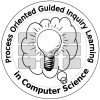Guiding Students to Discover CS Concepts and Develop Process Skills using POGIL
Fri evening workshop, SIGCSE 2014
Abstract: This workshop is for anyone who teaches CS, and introduces process-oriented guided inquiry learning (POGIL) in computer science. In a POGIL classroom, teams of 3-5 learners work on instructor-facilitated activities. Through scripted inquiry and investigation, learners discover concepts and construct their own knowledge. Using assigned team roles and meta-cognition, learners develop process skills and individual responsibility. Studies show that POGIL can significantly improve student performance. Workshop participants will experience POGIL activities, learn core practices, and draft activity pieces. POGIL materials for various CS concepts will be shared. More information is available at http://cspogil.org, including sample activities for CS1, CS2, and other courses. Laptops optional.
Intended Audience: This workshop is intended for anyone interested in teaching and learning approaches that are described as active, constructivist, or discovery-based, including both college and high school faculty. We assume familiarity with basic computer science concepts (e.g. CS2). We particularly welcome students, since they should find the activities interesting and their participation will help faculty understand both the strengths and limitations of this approach.
Presenter Backgrounds/Biographies
Clif Kussmaul, PhD, teaches CS at Muhlenberg College, and has developed POGIL activities for CS1, CS2, software engineering, and AI. He is the PI for an NSF TUES Type 1 Grant to develop sets of POGIL activities for CS and to foster a community of CS faculty who use and develop such materials. During 2009-2010 Clif was a Visiting Fulbright Scholar at the University of Kerala, India, where he used POGIL and other active learning techniques in graduate courses. Clif’s professional interests include active learning, free and open source software, distributed collaboration and knowledge management, and entrepreneurship.
Helen H. Hu, PhD, teaches CS at Westminster College in Salt Lake City. Since 2005, she has developed and revised POGIL activities for a scientific computing class (programming in Python). More recently, she has developed POGIL activities in a CS1 course in Java, and she is comparing student performance across multiple sections of CS1 (a POGIL section will be compared with a traditional-lecture section). She is the PI for an NSF CS10K Grant to introduce an Exploring Computer Science course to Utah high schools.
Matthew Lang, PhD, works at Google. Formerly, he taught CS at Moravian College, where he adopted POGIL practices and developed POGIL activities for various CS courses, including CS1, CS2, software engineering, computer organization, operating systems, and theory of computation. His interests in CS education include the development of collaboration skills and active learning. He is co-PI for an S-STEM project that emphasizes community-building to broaden participation in CS and mathematics.
Materials Provided: Participants will receive paper and/or electronic copies of all slides, handouts, and other materials; a variety of sample activities; and an annotated bibliography. More activities and materials are available at http://cspogil.org and http://pogil.org.
